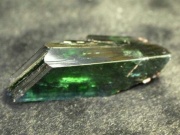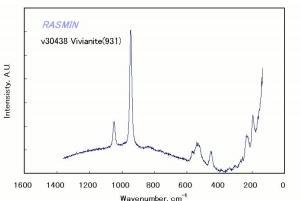Vivianite
Description
A naturally occurring pale blue earth pigment composed of Ferrous phosphate. Vivianite was named after its discoverer, J.G.Vivian, a 19th century English mineralogist. The mineral generally appears as dark indigo-blue to blackish green crystals and may be associated with Pyrite and Copper. Vivianite is also found in an earthy form, frequently associated with bones or decaying wood and in other organic, phosphate-rich environments, such as peat bogs and clay beds. Deposits are located in the Ukraine, Romania, Germany (Bavaria), England (Cornwall), Australia, Bolivia, Greenland, Japan, and the U.S.(New Jersey, Maryland, Delaware, Colorado). The pigment has been identified in medieval painting and polychromy in Germany, England, Sweden, and Norway. Ferrous phosphate was used as a pigment called blue ocher by the School of Cologne in the 13th and 14th centuries (Kremer Pigmente 2000). The earthy form of the pigment has also been identified in Dutch 17th century painting (Spring 2001). Though generally stable in its blue form, in some instances the pigment particles have partially altered to a yellow color thus producing an overall green appearance where a blue color was intended (Howard 2003).
Synonyms and Related Terms
ferrous phosphate; blue ocher; blue ochre (Br.); bleu de fer (Fr.); vivianite (Fr.; It., Port.); Vivianit (Deut.); vivianita (Esp.); terra azzurra (It.); vivianiet (Ned.); native Prussian blue
Risks
Slowly decomposes and darkens in light and air.
Physical and Chemical Properties
Monoclinic crystal system.Perfect cleavage in one direction. Fracture = splintery. Luster = pearly to vitreous.
Crystals typically prismatic, also flattened, or equant; often rounded into blade-like or lanceolate shapes; found in stellate clusters, as globular aggregates, tabular masses or concretions, crusts with fibrous to bladed structure, and earthy to pulverent.
When the mineral is in the ground and unexposed, it is often colourless. The change of the mineral on initial exposure from colorless to blue is due to increased ferric ion concentration. The blue form of the mineral displays distinctive blue-yellow pleochroism, and strong birefringence. Appears blue-green under Chelsea filter.
| Composition | Fe3(PO4)2 - 8H2O |
|---|---|
| CAS | 14940-41-1 |
| Mohs Hardness | 1.5 - 2.0 |
| Density | 2.58-2.68 |
| Refractive Index | 1.60; 1.63; 1.65 |
Comparisons
Characteristics of Common Blue Pigments
Resources and Citations
- Kremer-pigmente: Website
- Mineralogy Database: Vivianite
- Marika Spring, ‘Pigments and Color Change in the Paintings of Aelbert Cuyp’, Aelbert Cuyp, exhibition catalogue, ed. A. K. Wheelock Jr,, National Gallery of Art, Washington, 2001, pp. 65-73.
- Helen Howard, Pigments of English Medieval Wall Painting, Archetype Publications Ltd., 2003. Record content reviewed by EU-Artech, November 2007.
- Submitted information: Helen Howard, November 2007
- Richard S. Lewis, Hawley's Condensed Chemical Dictionary, Van Nostrand Reinhold, New York, 10th ed., 1993
- R.D. Harley, Artists' Pigments c. 1600-1835, Butterworth Scientific, London, 1982
- The Merck Index, Martha Windholz (ed.), Merck Research Labs, Rahway NJ, 10th edition, 1983 Comment: entry 4101
- Nicholas Eastaugh, Valentine Walsh, Tracey Chaplin, Ruth Siddall, Pigment Compendium, Elsevier Butterworth-Heinemann, Oxford, 2004 Comment: Refractive index: alpha=1.579-1.582; beta=1.602-1.604; gamma=1.629-1.635
- Encyclopedia Britannica, http://www.britannica.com Comment: "vivianite" [Accessed December 11, 2001]. (tech info)
- C.W.Chesterman, K.E.Lowe, Audubon Society Field Guide to North American Rocks and Minerals, Alfred A. Knopf, New York, 1979
- Wikipedia: http://en.wikipedia.org/wiki/Vivianite (Accessed Sept. 20, 2005)
- Van Nostrand's Scientific Encyclopedia, Douglas M. Considine (ed.), Van Nostrand Reinhold, New York, 1976
- Random House, Webster's Encyclopedic Unabridged Dictionary of the English Language, Grammercy Book, New York, 1997
- Art and Architecture Thesaurus Online, http://www.getty.edu/research/tools/vocabulary/aat/, J. Paul Getty Trust, Los Angeles, 2000

